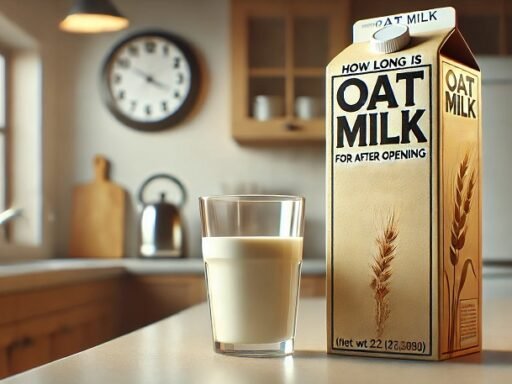Almonds are a popular nut, enjoyed for their versatility, taste, and health benefits. Whether eaten raw, roasted, or as part of a recipe, almonds are a staple in many households. But one question often arises: How long do almonds last? Understanding the shelf life of almonds is crucial to ensure you enjoy them at their best quality and avoid any potential health risks. In this comprehensive guide, we’ll explore various factors that influence almond shelf life, storage methods, and signs that your almonds may have gone bad.
Table of Contents
- What Determines the Shelf Life of Almonds?
- How Long Do Almonds Last at Room Temperature?
- How Long Do Almonds Last in the Refrigerator?
- How Long Do Almonds Last in the Freezer?
- How to Determine If Almonds Have Gone Bad
- Best Practices for Storing Almonds
- The Health Risks of Consuming Rancid Almonds
- Extending the Shelf Life of Almonds in Different Forms
- Conclusion
- FAQs About How Long Do Almonds Last
- 1. How long do almonds last in their shell?
- 2. Can I eat expired almonds?
- 3. How long do roasted almonds last compared to raw almonds?
- 4. Can I store almonds in the pantry?
- 5. How do I know if almonds have gone bad?
- 6. How long do almonds cut into slices or slivers stay fresh?
- 7. Is it safe to freeze almonds?
- 8. Do almonds go bad if left out overnight?
- 9. How long do almonds last after opening the package?
- 10. Can I store almonds in the original packaging?
What Determines the Shelf Life of Almonds?
When asking “how long do almonds last,” several factors come into play. These include the type of almond, storage conditions, and whether the almonds are raw, roasted, or processed. Let’s break these factors down:
1. Type of Almond
- Raw Almonds: Raw almonds have a relatively long shelf life when stored properly. Their natural oils are stable, which helps them remain fresh for extended periods.
- Roasted Almonds: Roasting almonds changes their chemical structure, making them more susceptible to oxidation. This process can shorten their shelf life compared to raw almonds.
- Processed Almonds: Almonds that have been sliced, chopped, or made into almond flour have a shorter shelf life due to the increased surface area exposed to air.
A L S O R E A D
Does Almond Milk Cause Constipation? The Truth
Do Squirrels Eat Almonds? Squirrel Invasion Alert
Can Birds Eat Almonds? A Hidden Danger for Birds?
Ice Bath While Pregnant Benefits: A Frozen Therapy
2. Storage Conditions
- Temperature: The temperature at which almonds are stored significantly affects their longevity. Warm environments accelerate the breakdown of fats in almonds, leading to rancidity.
- Light Exposure: Exposure to light can cause almonds to deteriorate faster. It’s best to store them in a dark place to preserve their quality.
- Moisture: Almonds stored in a humid environment are at risk of absorbing moisture, which can lead to mold growth and spoilage.
3. Packaging
The type of packaging can also impact how long almonds last. Airtight containers, vacuum-sealed bags, and original packaging with minimal air exposure can extend the shelf life of almonds.
How Long Do Almonds Last at Room Temperature?
The shelf life of almonds at room temperature depends on the conditions mentioned above. Generally, if stored in a cool, dark, and dry place, almonds can last:
- Raw Almonds: 6 to 12 months
- Roasted Almonds: 3 to 6 months
- Processed Almonds: 1 to 3 months
To maximize their freshness, store almonds in a pantry or cupboard away from heat sources, such as the stove or direct sunlight. It’s also advisable to keep them in their original packaging or an airtight container to prevent exposure to air and moisture.
How Long Do Almonds Last in the Refrigerator?
Refrigeration is an excellent option for extending the shelf life of almonds. The cooler temperature slows down the oxidation process, helping to keep the nuts fresh for a more extended period. When stored in the refrigerator:
- Raw Almonds: Up to 2 years
- Roasted Almonds: 1 year
- Processed Almonds: 6 to 9 months
For best results, store the almonds in an airtight container to protect them from absorbing odors from other foods in the refrigerator. It’s important to note that while refrigeration extends the shelf life, it may slightly affect the texture of the almonds, making them less crisp.
How Long Do Almonds Last in the Freezer?
Freezing almonds is the most effective method to preserve their freshness for an extended period. Almonds can be kept frozen for:
- Raw Almonds: Up to 2 years or more
- Roasted Almonds: 1 to 2 years
- Processed Almonds: 1 year
When freezing almonds, ensure they are placed in a moisture-proof and airtight container. Freezing locks in the freshness and prevents the nuts from becoming rancid, but it may slightly alter their texture when thawed.
How to Determine If Almonds Have Gone Bad
Despite your best efforts, almonds can still go bad over time. Recognizing the signs of spoilage is essential to avoid consuming rancid nuts. Here are some indicators that your almonds may have expired:
1. Smell
If almonds smell sour or bitter, they’re likely rancid. Fresh almonds have a mild, nutty aroma, so if you detect any off-putting odors, it’s best to discard them.
2. Taste
If almonds taste bad, they’re probably spoiled. It’s important not to consume almonds with an unusual taste, as rancidity can lead to digestive discomfort.
3. Appearance
Almonds that have turned bad may develop a dark, oily appearance. Additionally, if you notice any mold or unusual spots on the almonds, it’s a clear sign that they should not be consumed.
4. Texture
Fresh almonds are firm and crunchy. If your almonds feel soft or chewy, it’s a sign that they have absorbed moisture and are no longer fresh.
Best Practices for Storing Almonds
To maximize the shelf life of your almonds and ensure they remain fresh, consider the following best practices:
1. Use Airtight Containers
Always store almonds in airtight containers to minimize exposure to air, moisture, and odors. Glass jars with tight-fitting lids or vacuum-sealed bags are excellent choices.
2. Store in a Cool, Dark Place
Whether you’re storing almonds at room temperature, in the refrigerator, or in the freezer, it’s crucial to keep them in a cool, dark place. Keep almonds away from places with temperature changes, like near the stove or window.
3. Label and Date Your Almonds
Label almonds with the purchase date if you buy a large quantity or move them to a different container. This practice helps you keep track of their freshness and avoid consuming stale almonds.
4. Rotate Your Stock
Use the “first in, first out” method to ensure that older almonds are used before newer ones. This practice prevents almonds from sitting in storage for too long and going bad.
5. Buy in Moderation
While it might be tempting to buy almonds in bulk, especially when they’re on sale, consider purchasing only the amount you can consume within a few months. This way, you can enjoy fresh almonds without worrying about spoilage.
The Health Risks of Consuming Rancid Almonds
Understanding how long almonds last is not just about preserving their taste and texture; it’s also about ensuring your health. Rancid almonds are not just unpleasant to eat; they can also pose health risks. Consuming rancid nuts can lead to digestive issues such as stomach cramps, nausea, and diarrhea. The fats in almonds, when oxidized, form harmful compounds that can be toxic if consumed in large amounts. Therefore, it’s essential to check your almonds for any signs of spoilage before eating them.
Extending the Shelf Life of Almonds in Different Forms
Almonds are available in various forms, such as whole, sliced, slivered, and ground into flour. Each form has a different shelf life, and here’s how you can store them:
1. Whole Almonds
Whole almonds have the longest shelf life due to their intact structure, which protects the nut from oxidation. Store them in a cool, dry place to keep them fresh for up to 2 years.
2. Sliced or Slivered Almonds
These forms have a shorter shelf life due to the increased surface area exposed to air. They last up to 6 months at room temperature, 1 year in the refrigerator, and 1.5 years in the freezer.
3. Almond Flour
Almond flour, with its delicate texture, is susceptible to spoilage. For optimal freshness, store it in a sealed container. It can last for three months at room temperature, six months in the refrigerator, or up to a year in the freezer.
4. Almond Butter
Almond butter has a shorter shelf life because of the processing and the added ingredients. It can last 2 to 3 months at room temperature and up to 6 months in the refrigerator. Stir the butter occasionally to prevent oil separation, which can lead to rancidity.
Conclusion
In summary, how long do almonds last depends on various factors, including storage conditions, type of almond, and whether they are raw, roasted, or processed. By following proper storage practices and keeping an eye on the signs of spoilage, you can enjoy fresh and delicious almonds for an extended period. Whether stored at room temperature, in the refrigerator, or in the freezer, almonds can remain a healthy and tasty addition to your diet if you take the necessary steps to preserve their freshness. Now that you know how long do almonds last, you can confidently buy and store almonds, ensuring they stay fresh and nutritious for as long as possible.
FAQs About How Long Do Almonds Last
1. How long do almonds last in their shell?
Almonds in their shell typically last longer than shelled almonds because the shell provides a natural barrier against moisture and air. Almonds in their shells can stay fresh for up to 2 years when kept in a cool, dry environment. For even longer storage, consider refrigerating or freezing them.
2. Can I eat expired almonds?
While it’s not recommended to eat almonds that are past their expiration date, the actual shelf life depends on storage conditions. If the almonds look, smell, and taste normal, they may still be safe to eat. However, if they have an off smell, taste bitter, or appear discolored, it’s best to discard them.
3. How long do roasted almonds last compared to raw almonds?
Roasted almonds have a shorter shelf life than raw almonds due to the heat exposure during roasting, which can cause the oils to oxidize more quickly. Roasted almonds generally last 3 to 6 months at room temperature, while raw almonds can last 6 to 12 months under the same conditions.
4. Can I store almonds in the pantry?
Yes, you can store almonds in the pantry as long as it’s a cool, dark, and dry place. However, to extend their shelf life, it’s better to store them in the refrigerator or freezer, especially if you live in a warm or humid climate.
5. How do I know if almonds have gone bad?
Signs that almonds have gone bad include a sour or bitter smell, an off taste, and changes in appearance, such as darkening or an oily texture. If you notice any of these symptoms, the almonds are probably bad and should be discarded.
6. How long do almonds cut into slices or slivers stay fresh?
Almonds cut into slices or slivers spoil more quickly because they have more surface area exposed. They can last up to six months at room temperature, a year in the refrigerator, or a year and a half in the freezer when stored in a sealed container.
7. Is it safe to freeze almonds?
Freezing is an effective way to keep almonds fresh for longer. When properly stored in an airtight container, raw almonds can last up to 2 years in the freezer, while roasted and processed almonds can last 1 to 2 years.
8. Do almonds go bad if left out overnight?
Leaving almonds out overnight at room temperature generally won’t cause them to go bad immediately, especially if they’re stored in an airtight container. However, prolonged exposure to air and moisture can accelerate spoilage, so it’s best to return them to proper storage as soon as possible.
9. How long do almonds last after opening the package?
Once opened, almonds should be stored in an airtight container to maintain their freshness. At room temperature, they can last 6 to 12 months, depending on whether they are raw or roasted. Storing almonds in the refrigerator or freezer can help them last longer.
10. Can I store almonds in the original packaging?
If the original packaging is resealable and airtight, you can store almonds in it. However, for better protection against air and moisture, consider transferring the almonds to a glass jar with a tight-fitting lid or a vacuum-sealed bag.






